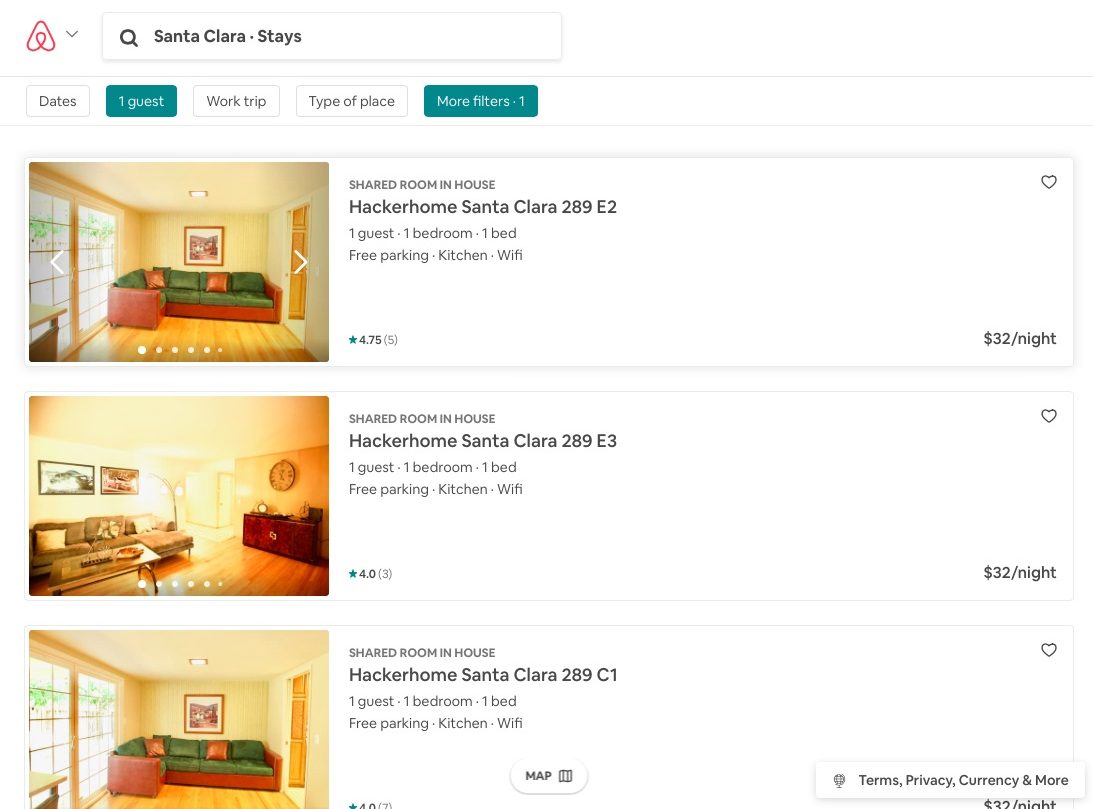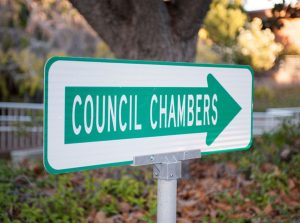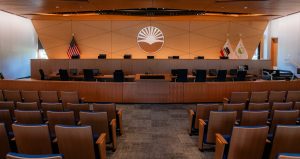Single-family neighborhoods are supposed to be quiet places. It is a concept that homeowners buy into when they purchase their home. With skyrocketing real estate costs, the expectation is that the exorbitant price tag in a single-family neighborhood also buys a certain atmosphere. It is part of what you are paying for.
However, on Santa Clara’s Sycamore Way, one home threw a wrench in that social contract. When the owners of 2892 Sycamore Way came to the Architectural Review Committee (ARC) last Spring asking for a rebuild that would expand the house to five-bedroom, four-and-a-half bathroom, six exterior exit home, the property’s use as an Airbnb rental became obvious.
For some time, as many as 18 nightly rentals had been listed on Airbnb for between $22 and $50 a night. The Weekly verified these listings and they were still live in July.
According to neighbors, with those guests came empty Solo cups littering the street, overcrowded parking, strangers urinating in lawns and milling around the neighborhood looking for the right house or sleeping in their cars when they were unable to do so.
When the ARC approved a modified version of the rebuild — five bedrooms, three-and-a-half baths, three exterior entrances — the neighbors decided to take the issue to the Planning Commission.
“It is no secret they are running a ‘hostel’ type operation,” neighbor Jan Eurich wrote to the City. “As a result of this ‘business,’ there is traffic congestion and lack of street parking in our once quiet neighborhood, different people around all the time and people sleeping in their cars on the street and in the house’s driveway. We do not know who these ‘tenants’ are, how long they will be staying or what they are doing here.”
“It was clearly an egregious violation of what we want in the City,” said Planning Commissioner Suds Jain in a phone interview.
While it is clear that the spirit of the neighborhood was being violated, nothing in the zoning code prohibits short-term rentals.
Jain said he actually likes having more people around the neighborhood, pointing to areas of Santa Clara that have a large student population; he said it makes him feel safer. All the same, more stringent code enforcement surrounding the aforementioned issues is needed, he said.
“It is the behavior that we need to regulate,” he said.
Planning Commissioner Yuki Ikezi lives near the Sycamore Way property, but said she was unaware that it was being used as an Airbnb until the item came to the Planning Commission in August.
At that meeting, the Planning Commission was unable to come to a decision and forwarded the ARC’s revised plan to the City Council without a recommendation. Earlier this month, the Planning Commission and City Council held a joint study session to discuss the general issue of short-term rentals in the zoning code, which has not been updated since its inception in 1969.
Andrew Crabtree, Santa Clara Director of Community Development, said the issue with the Sycamore Way home being used as a short-term rental has since been resolved. He said the owner claims to have leased the property to someone who listed it on Airbnb and has since taken it down. The Weekly has verified that the listings are gone. However, the renter whose screen name is Xpm, still has rentals on Airbnb.
The topic brought into crisp focus the problem with short-term rentals and necessitated the study session about the zoning code update. The update, Crabtree said, would limit the number of days a host can use their home for short-term rentals to 90 days a year without the host present. This limitation would not exist if the host is present, but limits on how many people can rent a property would still apply.
“We are trying to find the balance between what community members want to do with their houses and potential abuses,” he said. “[Operating a short-term rental] is really not in keeping with the character of a single-family neighborhood.”
But Airbnb already places a 90-day-per-year restriction on rentals. An email to Airbnb’s media inquiries department went unreturned as of press time.
Ikezi said the new regulation would make the situation more clear-cut.
“All the City has to look at is the homeowner meeting the Airbnb zoning rule, and the answer is either yes or no,” she said.
Still, as with most things, the language in the regulation will prove important, she added. Although the owner may be sincere in removing the property from Airbnb, Ikezi said many neighbors disbelieve that the home will not be used as a short-term rental.
And, Crabtree said, that remains a possibility. Until the code update is codified, someone can still operate an Airbnb out of a single-family home even if they are unable to renovate without permits. He said the City is trying to address any problems arising from the gap in the zoning code on a case-by-case basis until then.
The Council will decide whether to uphold or overturn the Architectural Review Committee’s approval of the renovation at its Oct. 29 meeting, 6 p.m. in the Council Chambers at City Hall, 1500 Warburton Ave. in Santa Clara. The zoning code update is set to come before the Council in late Spring 2020.












0 comments